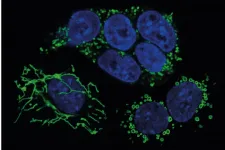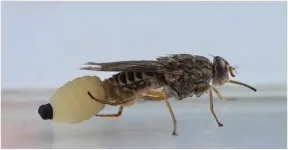(Press-News.org) In the largest study of its kind, an investigation by UC San Francisco has found no evidence that moderate coffee consumption can cause cardiac arrhythmia.
In fact, each additional daily cup of coffee consumed among several hundred thousand individuals was associated with a 3 percent lower risk of any arrhythmia occurring, including atrial fibrillation, premature ventricular contractions, or other common heart conditions, the researchers report. The study included a four-year follow up.
The paper is published July 19, 2021, in JAMA Internal Medicine.
"Coffee is the primary source of caffeine for most people, and it has a reputation for causing or exacerbating arrhythmias," said senior and corresponding author Gregory Marcus, MD, professor of medicine in the Division of Cardiology at UCSF.
"But we found no evidence that caffeine consumption leads to a greater risk of arrhythmias," said Marcus, who specializes in the treatment of arrhythmias. "Our population-based study provides reassurance that common prohibitions against caffeine to reduce arrhythmia risk are likely unwarranted."
While some professional societies suggest avoiding caffeinated products to lower the risk for arrhythmia, this connection has not been consistently demonstrated - indeed, coffee consumption may have anti-inflammatory benefits and is associated with reduced risks of some illnesses including cancer, diabetes, and Parkinson disease.
In the new study, UCSF scientists explored whether habitual coffee intake was associated with a risk of arrhythmia, and whether genetic variants that affect caffeine metabolism could modify that association. Their investigation was conducted via the community-based UK Biobank, a prospective study of participants in England's National Health Services.
Some 386,258 coffee drinkers took part in the coffee research, with an average mean age of 56 years; slightly more than half were female. It was an unprecedented sample size for this type of inquiry.
In addition to a conventional analysis examining self-reported coffee consumption as a predictor of future arrhythmias, the investigators employed a technique called "Mendelian Randomization," leveraging genetic data to infer causal relationships. As those with the genetic variants associated with faster caffeine metabolism drank more coffee, this analysis provided a method to test the caffeine-arrhythmia relationship in a way that did not rely on participant self-report and should have been immune to much of the confounding inherent to most observational studies.
With a mean four-year follow up, data were adjusted for demographic characteristics, health and lifestyle habits.
Ultimately, approximately 4 percent of the sample developed an arrhythmia. No evidence of a heightened risk of arrhythmias was observed among those genetically predisposed to metabolize caffeine differently. The researchers said that higher amounts of coffee were actually associated with a 3 percent reduced risk of developing an arrhythmia.
The authors noted limitations including the self-reporting nature of the study, and that detailed information on the type of coffee - such as espresso or not - was unavailable.
"Only a randomized clinical trial can definitively demonstrate clear effects of coffee or caffeine consumption," said Marcus. "But our study found no evidence that consuming caffeinated beverages increased the risk of arrhythmia. Coffee's antioxidant and anti-inflammatory properties may play a role, and some properties of caffeine could be protective against some arrhythmias."
INFORMATION:
Co-authors are Eun-jeong Kim, MD; Thomas J. Hoffmann, PhD; Gregory Nah, MA; Eric Vittinghoff, PhD; and Francesca Delling, MD, all of UCSF.
Disclosures can be found in the paper.
About UCSF Health: UCSF Health is recognized worldwide for its innovative patient care, reflecting the latest medical knowledge, advanced technologies and pioneering research. It includes the flagship UCSF Medical Center, which is ranked among the top 10 hospitals nationwide, as well as UCSF Benioff Children's Hospitals, with campuses in San Francisco and Oakland, Langley Porter Psychiatric Hospital and Clinics, UCSF Benioff Children's Physicians and the UCSF Faculty Practice. These hospitals serve as the academic medical center of the University of California, San Francisco, which is world-renowned for its graduate-level health sciences education and biomedical research. UCSF Health has affiliations with hospitals and health organizations throughout the Bay Area. Visit http://www.ucsfhealth.org/. Follow UCSF Health on Facebook or on Twitter
Follow UCSF
ucsf.edu | Facebook.com/ucsf | YouTube.com/ucsf
It is a scenario familiar to anyone who has driven down a crowded, narrow street. Parked cars line both sides, and there isn't enough space for vehicles traveling in both directions to pass each other. One has to duck into a gap in the parked cars or slow and pull over as far as possible for the other to squeeze by.
Drivers find a way to negotiate this, but not without close calls and frustration. Programming an autonomous vehicle (AV) to do the same -- without a human behind the wheel or knowledge of what the other driver might do -- presented a unique challenge ...
Wind energy is of outstanding importance to the energy transition in Germany. According to the Federal Statistical Office, its share in total gross electricity production of about 24% is far higher than those of all other renewable energy sources. "To reach our climate goals, it is important to further expand these capacities and to replace as much coal-based power as possible," says Professor Wolf Fichtner from KIT's Institute for Industrial Production (IIP). "However, there is considerable resistance, especially in beautiful landscapes." A team of researchers from KIT, the University of Aberdeen, and the Technical University of Denmark has now calculated what this means for the costs ...
The photovoltaic effect of ferroelectric crystals can be increased by a factor of 1,000 if three different materials are arranged periodically in a lattice. This has been revealed in a study by researchers at Martin Luther University Halle-Wittenberg (MLU). They achieved this by creating crystalline layers of barium titanate, strontium titanate and calcium titanate which they alternately placed on top of one another. Their findings, which could significantly increase the efficiency of solar cells, were published in the journal Science Advances.
electric crystals do not require a so-called pn junction to create the photovoltaic effect, in other words, no positively and negatively doped layers. This makes it much easier to produce ...
A study led by D. Ross Camidge, MD, PhD, director of thoracic oncology at the University of Colorado School of Medicine and CU Cancer Center member, has helped to define MET amplification as a rare but potentially actionable driver for non-small cell lung cancer (NSCLC).
Camidge says many of the major developments in the treatment of non-small cell lung cancer have come from defining molecularly specific subsets of the disease for which researchers have been able to develop targeted treatments. Until now, all of these subsets have been based on either genetic mutations or gene rearrangements ...
As multicellular life relies on cell-cell interactions, it is not surprising that this is not always peaceful: cells with higher fitness eliminate cells with lower fitness through cell competition. Cell competition has emerged as a quality control mechanism and occurs when cells differ, genetically or otherwise, from each other. In mammals, the process of cell competition has been observed e.g., in cancer, during organ homeostasis, and during development as a process to select the fittest cells in the embryo and the adult. However, the features that distinguish "winner" from "loser" cells and whether there are key determinants for cell competition in various biological ...
PULLMAN, Wash. - When it comes to craft beer, the flavor doesn't have to be all in the hops. As a panel of amateur beer tasters at Washington State University recently demonstrated, malted barley, the number one ingredient in beer besides water, can have a range of desirable flavors too.
Researchers recruited a panel of about 100 craft beer drinkers to taste some so-called SMaSH beers--those brewed with a single barley malt and single hop. All the beers contained the same hop variety, called Tahoma, but each had a malt from a different barley genotype, or genetic makeup. Trained tasters can distinguish these easily, but even the untrained ...
An international group of researchers representing thousands of coral scientists across the globe is calling for new commitments and actions by the world's policymakers to protect and restore coral reefs.
In a paper presented July 20 at the International Coral Reef Symposium, the scientists said that the coming decade will likely offer the last chance for policymakers at all levels to prevent coral reefs "from heading towards world-wide collapse."
The paper, developed by the International Coral Reef Society, pushes for three strategies to save the reefs: addressing climate change, improving local conditions and actively restoring coral. ...
The female tsetse fly, which gives birth to adult-sized live young, produce weaker offspring as they get older, and when they feed on poor quality blood.
The study, carried out by researchers at the Universities of Bristol, Oxford and the Liverpool School of Tropical Medicine, was designed to measure how tsetse offspring health is influenced by their mothers' age, and how factors such as the mother's nutrition and mating experience might come into play.
In many animals, females show signs of reproductive ageing - where offspring health declines with maternal age - but there is huge variation within species in how rapidly this ageing occurs.
Scientists found that female tsetse that experience ...
For more than 20 years, Makoto Miyata from Osaka City University has been studying the gliding motility of the parasitic bacterium Mycoplasma mobile (M. mobile). It is a mechanism consisting of an external "grabbing" structure and internal "motor" - the motor having yet to be clarified on a molecular level. In collaboration with Osaka University and Kanazawa University, his research team used electron microscopy and high-speed atomic force microscopy (high-speed AFM) to reveal that the bacteria's molecular motor consists of two ATP synthase-like complexes, suggesting an unexpected evolution of the protein. Their findings were published in mBio.
Based on genetic information, researchers have suggested that the ...
Imagine you're a CEO who wants to promote an innovative new product -- a time management app or a fitness program. Should you send the product to Kim Kardashian in the hope that she'll love it and spread the word to her legions of Instagram followers? The answer would be 'yes' if successfully transmitting new ideas or behavior patterns was as simple as showing them to as many people as possible.
However, a forthcoming study in the journal Nature Communications finds that as prominent and revered as social influencers seem to be, in fact, they are unlikely to change a person's behavior by example -- and might actually be detrimental to the cause.
Why?
"When social influencers present ideas that are ...





